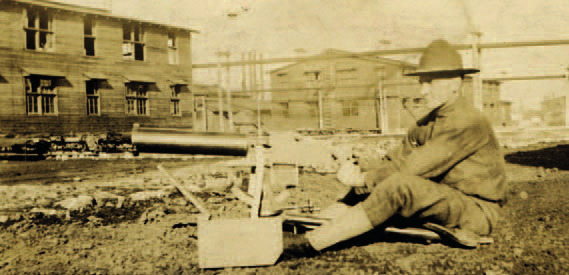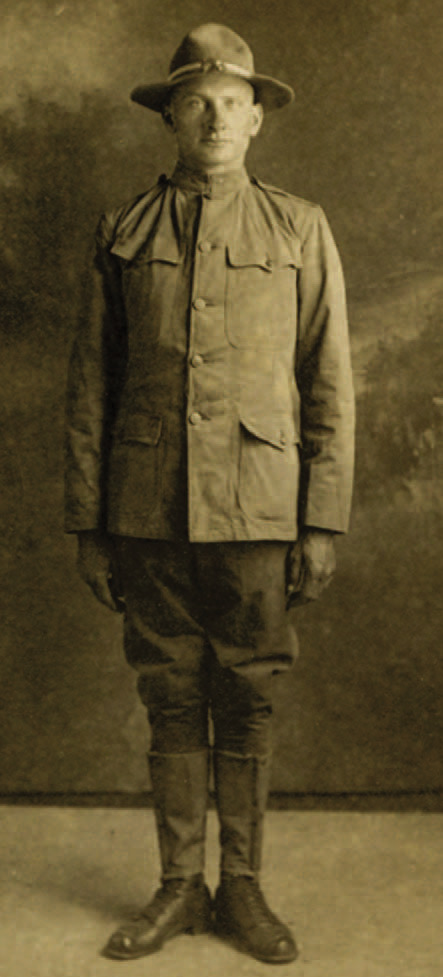Jochim “Joe” Blunck
World War I
Jochim “Joe” Blunck was born Sept. 10, 1894, on the family farm northwest of Osmond to August and Caroline Blunck, and was one of 10 children.
According to his history in the Osmond Centennial Book, “Life on the farm in those early days was difficult but Joe was able to attend school at District 79. He often made the statement that he went through the eighth grade four times because he was needed at home during the busy harvest and spring work seasons and was only able to attend during the winter months.”
Joe enlisted on Aug. 8, 1918, when he was just about 24 years old. An article in the Aug. 29, 1918, Pierce County Call has him listed with eight others, including Adolph Brunckhorst of Osmond and Henry Korth of McLean, leaving for Camp Funston, Kansas, “to take upon themselves the lives of soldiers.” It says the company was escorted to the depot by the Pierce home guards, and the Osmond Red Cross furnished the boys well-filled baskets of eatables.
Joe arrived at Camp Funston and went through basic training, but then contracted the Spanish flu. According to son Dale, his dad said the man in the cot next to him died of the flu.
Then, before he got better and could be shipped overseas, the war was over. So he was discharged Jan. 23, 1919, returned to Osmond and went back to farming.
Joe married Eva Nelson on March 26, 1924, and they had three sons: Kenneth, Wayne and Dale. They lived through the “Dirty Thirties” and the Great Depression together. They were able to add onto their home in 1936, as Joe said “There is no corn to pick, so let’s remodel the house.” Several years later, Joe was instrumental in getting REA to bring electricity to their area.
Dale said his dad loved to work with livestock, and was around livestock all during his farming days. He said Joe really didn't hunt or fish, but Dale spent time with him going to a lot of cattle sales. Dale said his dad was very easy-going and got along with everyone in the neighborhood, and in the family.
Joe grew corn, oats and alfalfa, milked cows and raised hogs and chickens. But Dale said Joe didn’t know anything about irrigation — that was added when Dale returned from the military in 1957.
Joe lived on the farm that had belonged to his parents, and later, Dale lived there with his mother, Eva. It later went to Joe’s great-grandson Matthew. So the land has been in the Blunck family for over 100 years, Dale said.
Joe’s parents had come from Germany, in fact, said Dale, the oldest two children in the family were born in Germany. Joe spoke fluent German - apparently, his father spoke English, but his mother absolutely would not speak English. So Dale did learn a few words of German from them, but very little.
When Joe was with the neighbors, it was a whole German community, Dale recalled, “And oh gosh, they’d rattle off in German” because the families around them were just about 100% German. That lasted until World War II, when it became a no-no to speak German.
Joe Blunck was not a large producer, compared to his father, but he did have enough land that he left some to each of his sons, and set them all up on their own farm. The eldest son, Kenneth, received a half section, but Wayne and he each got a quarter section, Dale laughed. But Kenneth had four children, and Joe wanted to make sure his grandchildren all had some real estate, Dale explained. Plus, the sons actually were doing well financially, he added.
Dale said he took his parents on trips to places like California and the Rocky Mountains in later years, but then Joe had a stroke. Dale and his mom then took care of him, on the farm, for the last 4½ years of his life, because he couldn’t walk or talk.
Joe served on the District 61 school board for about 20 years, the same school his three sons each attended for eight years. In the 1930s, Joe helped measure the crops grown in Thompson Precinct in Pierce County. This was done every year using a 100-ft. tape, Dale said. The work was done for a government farm program.
Joe died April 27, 1977. He is buried in the city cemetery, on the left-hand side, six rows or ¾ of the way up the hill and halfway across the row.

Joe Blunck is shown at Camp Funston practicing with a 30-cal. water-cooled machine gun








